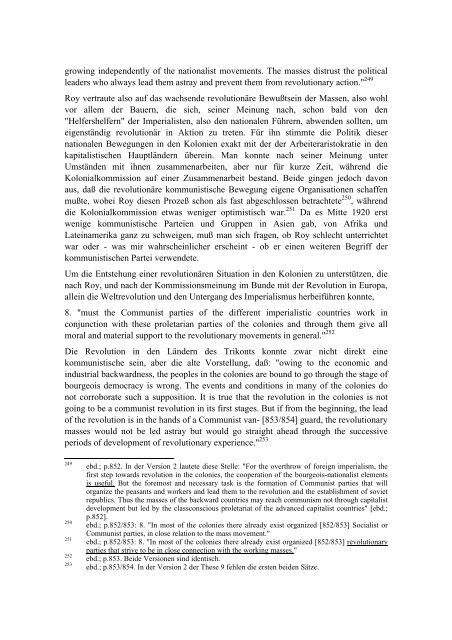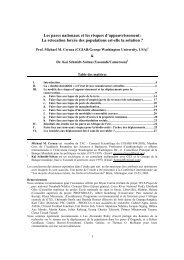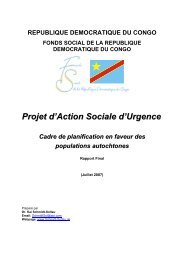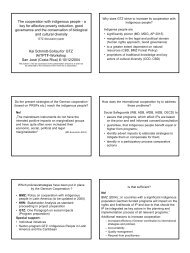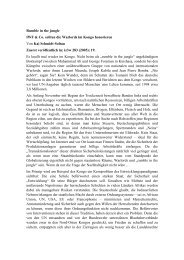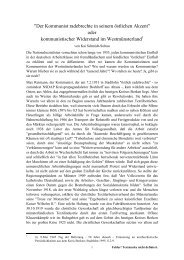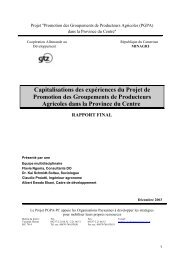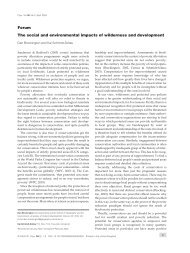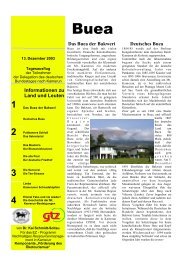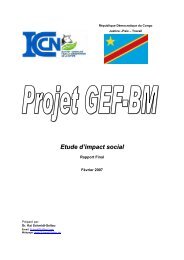Eine Welt zu gewinnen! - Dr. Kai Schmidt-Soltau
Eine Welt zu gewinnen! - Dr. Kai Schmidt-Soltau
Eine Welt zu gewinnen! - Dr. Kai Schmidt-Soltau
Sie wollen auch ein ePaper? Erhöhen Sie die Reichweite Ihrer Titel.
YUMPU macht aus Druck-PDFs automatisch weboptimierte ePaper, die Google liebt.
growing independently of the nationalist movements. The masses distrust the political<br />
leaders who always lead them astray and prevent them from revolutionary action." 249<br />
Roy vertraute also auf das wachsende revolutionäre Bewußtsein der Massen, also wohl<br />
vor allem der Bauern, die sich, seiner Meinung nach, schon bald von den<br />
"Helfershelfern" der Imperialisten, also den nationalen Führern, abwenden sollten, um<br />
eigenständig revolutionär in Aktion <strong>zu</strong> treten. Für ihn stimmte die Politik dieser<br />
nationalen Bewegungen in den Kolonien exakt mit der der Arbeiteraristokratie in den<br />
kapitalistischen Hauptländern überein. Man konnte nach seiner Meinung unter<br />
Umständen mit ihnen <strong>zu</strong>sammenarbeiten, aber nur für kurze Zeit, während die<br />
Kolonialkommission auf einer Zusammenarbeit bestand. Beide gingen jedoch davon<br />
aus, daß die revolutionäre kommunistische Bewegung eigene Organisationen schaffen<br />
mußte, wobei Roy diesen Prozeß schon als fast abgeschlossen betrachtete 250 , während<br />
die Kolonialkommission etwas weniger optimistisch war. 251 Da es Mitte 1920 erst<br />
wenige kommunistische Parteien und Gruppen in Asien gab, von Afrika und<br />
Lateinamerika ganz <strong>zu</strong> schweigen, muß man sich fragen, ob Roy schlecht unterrichtet<br />
war oder - was mir wahrscheinlicher erscheint - ob er einen weiteren Begriff der<br />
kommunistischen Partei verwendete.<br />
Um die Entstehung einer revolutionären Situation in den Kolonien <strong>zu</strong> unterstützen, die<br />
nach Roy, und nach der Kommissionsmeinung im Bunde mit der Revolution in Europa,<br />
allein die <strong>Welt</strong>revolution und den Untergang des Imperialismus herbeiführen konnte,<br />
8. "must the Communist parties of the different imperialistic countries work in<br />
conjunction with these proletarian parties of the colonies and through them give all<br />
moral and material support to the revolutionary movements in general." 252<br />
Die Revolution in den Ländern des Trikonts konnte zwar nicht direkt eine<br />
kommunistische sein, aber die alte Vorstellung, daß: "owing to the economic and<br />
industrial backwardness, the peoples in the colonies are bound to go through the stage of<br />
bourgeois democracy is wrong. The events and conditions in many of the colonies do<br />
not corroborate such a supposition. It is true that the revolution in the colonies is not<br />
going to be a communist revolution in its first stages. But if from the beginning, the lead<br />
of the revolution is in the hands of a Communist van- [853/854] guard, the revolutionary<br />
masses would not be led astray but would go straight ahead through the successive<br />
periods of development of revolutionary experience." 253<br />
249<br />
250<br />
251<br />
252<br />
253<br />
ebd.; p.852. In der Version 2 lautete diese Stelle: "For the overthrow of foreign imperialism, the<br />
first step towards revolution in the colonies, the cooperation of the bourgeois-nationalist elements<br />
is useful. But the foremost and necessary task is the formation of Communist parties that will<br />
organize the peasants and workers and lead them to the revolution and the establishment of soviet<br />
republics. Thus the masses of the backward countries may reach communism not through capitalist<br />
development but led by the classconscious proletariat of the advanced capitalist countries" [ebd.;<br />
p.852].<br />
ebd.; p.852/853: 8. "In most of the colonies there already exist organized [852/853] Socialist or<br />
Communist parties, in close relation to the mass movement."<br />
ebd.; p.852/853: 8. "In most of the colonies there already exist organized [852/853] revolutionary<br />
parties that strive to be in close connection with the working masses."<br />
ebd.; p.853. Beide Versionen sind identisch.<br />
ebd.; p.853/854. In der Version 2 der These 9 fehlen die ersten beiden Sätze.


